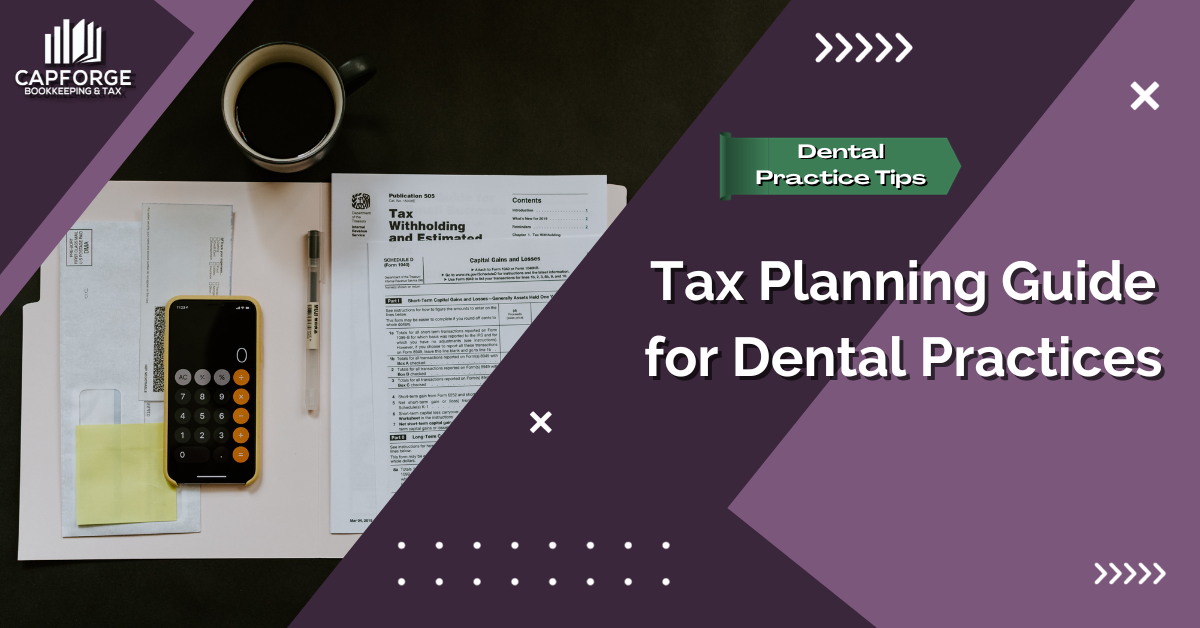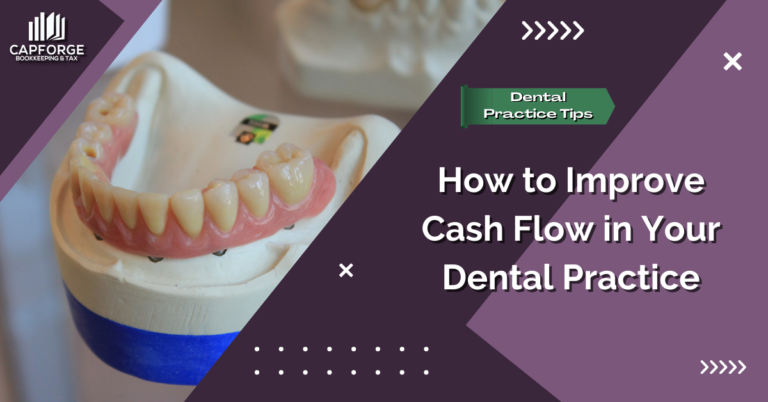Tax Planning Guide for Dental Practices
As a dental practice owner, tax planning is an essential part of managing your finances. With careful thought and preparation, you can help reduce your tax liability and allocate your resources to more important matters.
However, navigating the complex world of tax laws and regulations can be overwhelming, especially if you are not familiar with the process. That’s why we’ve put together this tax planning guide for dental practices to help you understand the basics and make informed decisions.
Understanding tax planning in dental practices
As a dental practice owner, you need to understand the basics of tax planning to ensure that you are making the most of your available deductions. Tax planning involves taking advantage of various tax breaks and credits that can reduce your tax bill.
One of the most important aspects of this process is understanding the different types of taxes that you will be responsible for as a dental practice owner. These include income tax, payroll tax, sales tax, and property tax. Each of these taxes has its own rules and regulations that you must comply with.
To effectively plan for your taxes, you should work with a qualified tax professional who can help you identify all of the deductions and credits that you are eligible for. Some common deductions for dental practices include:
- Depreciation of equipment and property
- Employee benefits such as health insurance and retirement plans
- Business travel expenses
- Office supplies and equipment
- Rent and utilities
In addition to deductions, there are also several tax credits that you may be eligible for as a dental practice owner. These include: - Work Opportunity Tax Credit (WOTC)
- Research and Development (R&D) Tax Credit
- Small Business Health Care Tax Credit
You want to take advantage of these deductions and credits to significantly reduce your tax liability and keep more money in your pocket.
Also, it’s important to note that tax laws are constantly changing, making it crucial to stay up-to-date on the latest regulations and requirements. Working with a tax professional like us can help ensure that you are always in compliance with the latest tax laws and regulations.
Effective tax planning strategies for dental practices
As a dental practice owner, you have a lot to handle on your plate. From managing staff to providing quality care to your patients, it can be difficult to find time to focus on tax planning. The good news is you can simplify this process to further boost your cash flow. Here are some strategies to help you maximize deductions and make the most of your investments.
1. Maximizing deductions
One of the most important aspects of tax planning is maximizing deductions. Here are some deductions that dental practices should be aware of:
- Office expenses: This includes rent, utilities, and office supplies.
- Equipment expenses: This includes dental equipment, computers, and software.
- Employee expenses: This includes salaries, benefits, and training.
- Marketing expenses: This includes advertising and website expenses.
You want to keep accurate records of these expenses throughout the year so that you can take advantage of all available deductions. Consider using accounting software to make this process easier.
2. Planning investment strategies
Another important aspect of tax planning is investing your money wisely. Here are some investment strategies that dental practices should consider:
Retirement plans: Consider setting up a 401(k) or other retirement plan for yourself and your employees. Not only will this help you save for retirement, but it can also provide tax benefits.
- Real estate: If you own your office space, consider using a cost segregation study to maximize depreciation deductions.
- Equipment leasing: Leasing equipment can provide tax benefits by allowing you to deduct lease payments.
We suggest you work with a financial advisor to determine the best investment strategies for your practice.
3. Structuring the practice efficiently
Determining the most tax-friendly structure for a dental practice depends on various factors, and there is no one-size-fits-all answer. However, several common business structures are often considered, each with its own tax implications.
A. Sole proprietorship
- Pros: Simple to set up and operate, with income reported on the owner’s personal tax return.
- Cons: Limited liability is a concern, and tax rates for individuals can be higher than corporate rates.
B. Partnership
- Pros: Pass-through taxation, meaning profits and losses pass through to individual partners’ tax returns.
- Cons: Similar to sole proprietorships, partners have personal liability, and the tax situation may become complex depending on the partnership agreement.
C. Limited Liability Company (LLC)
- Pros: Combines limited liability with pass-through taxation, offering flexibility in structuring management and ownership.
- Cons: Depending on the number of members, the IRS may treat an LLC as a partnership or a disregarded entity, impacting taxation.
D. S Corporation
- Pros: Pass-through taxation, similar to a partnership, with the added benefit of limited liability for shareholders.
- Cons: Stricter ownership requirements and certain limitations on the types of shareholders may apply.
E. C Corporation
- Pros: Limited liability for shareholders, the potential for lower corporate tax rates, and the ability to retain earnings within the business.
- Cons: Double taxation on profits (at the corporate and individual levels) and more complex compliance requirements.
The choice between these structures depends on factors such as the dentist’s long-term goals, risk tolerance, and the desire for flexibility in management and taxation. Dental practitioners should consult with tax professionals and legal advisors to assess their specific situation and determine the most tax-efficient structure for their practice.
Common tax planning mistakes in dental practices
Dental practices, like any other business, can sometimes fall prey to common tax planning mistakes. Recognizing and addressing these errors is crucial for maintaining financial health and maximizing tax benefits. Here are some common mistakes that dental practices should be cautious about:
- Incomplete record-keeping: Failing to maintain accurate and detailed records is a common mistake. Proper record-keeping is essential for claiming deductions and credits. Dental practices should keep track of all expenses, income, and relevant financial transactions throughout the year.
- Ignoring deductions: Some dental practices may overlook eligible deductions. Common deductions include expenses related to equipment, supplies, office space, employee salaries, and continuing education. Regularly reviewing allowable deductions with a tax professional can help identify potential savings.
- Misclassification of workers: Incorrectly classifying workers as independent contractors instead of employees, or vice versa, can lead to tax issues. Understanding the distinctions and ensuring proper classification is important to comply with tax laws and regulations.
- Overlooking depreciation: Dental practices often invest in costly equipment. Failing to take advantage of depreciation deductions over the useful life of these assets can result in missed opportunities to lower taxable income.
- Failure to plan for tax liability: Waiting until the end of the fiscal year to address tax planning can limit the effectiveness of strategies. Regularly reviewing financial performance and tax obligations throughout the year allows for proactive planning and adjustments.
- Inadequate retirement planning: Neglecting retirement planning can be a costly mistake. Dental practice owners should explore tax-advantaged retirement plans, such as SEP-IRAs or 401(k)s, to optimize long-term savings while benefiting from potential tax advantages.
Conclusion
In the ever-evolving landscape of tax planning, a proactive and informed approach not only mitigates immediate tax burdens but also positions dental practices for long-term financial health and stability. Through the adoption of these strategies, dental professionals can focus on providing excellent patient care while navigating the intricate realm of tax planning with confidence and efficiency.
Does your dental practice need help with sorting its financial records? If so, our team is here to help! Feel free to fill out the form below, and we’ll get in touch with you shortly.








